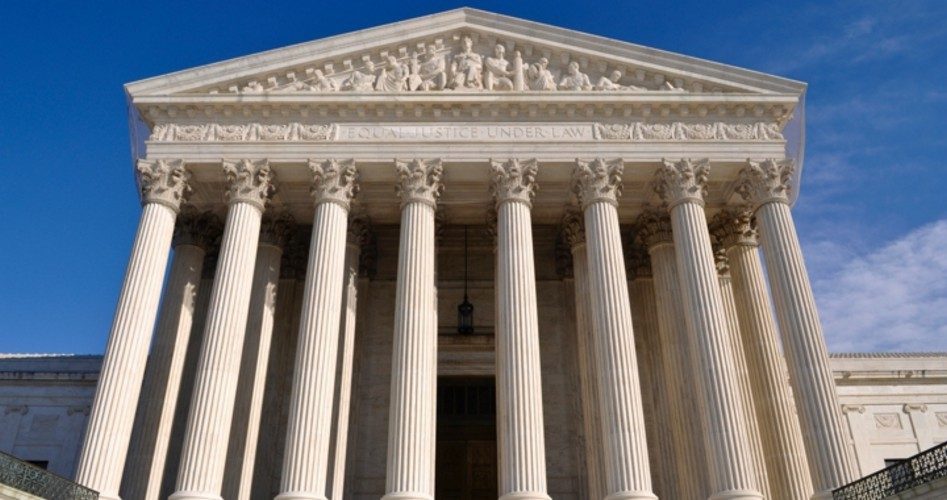
On October 2, the Supreme Court rejected a request from the Obama administration to rehear the case of United States v. Texas, which blocked the administration from implementing its plan to shield millions of illegal immigrants from deportation and to grant them the right to work legally in the United States.
It was the second time the administration’s attempt to revive its stalled amnesty program failed to get a favorable decision from the high court.
The Supreme Court’s tie 4-4 vote on the case on June 23 left intact a lower-court ruling that blocked the administration from implementing its plan, which has been on hold since U.S. District Judge Andrew S. Hanen of the U.S. District Court for the Southern District of Texas in Brownsville issued an injunction on February 16, 2015 that blocked it.
Hanen’s injunction prevented the federal government from implementing the administration’s use of executive actions to grant relief from deportation, legal status, and permission to apply for work permits to illegal aliens who are the parents of a U.S. citizen or a lawful permanent resident.
The injunction blocked Homeland Security (DHS) Secretary Jeh Johnson from implementing the Deferred Action for Parents of Americans and Lawful Permanent Residents (DAPA) program described in his November 20, 2014 memorandum. That memorandum expanded DACA (Deferred Action for Childhood Arrivals), which was initiated in 2012 by a policy memorandum sent from former DHS Secretary Janet Napolitano. It removed DACA’s age cap and also extended work authorization for some illegal aliens who have been granted legal status to three years.
The Obama administration’s DOJ appealed the ruling, after which a three-judge panel from the U.S. Court of Appeals for the Fifth Circuit in New Orleans upheld Hanen’s injunction on November 9, 2015. Soon afterwards, a DOJ spokesman stated that the administration would file a petition asking the Supreme Court to review the case, and on January 19, 2016, the High Court agreed to do just that.
Had Justice Antonin Scalia not passed away in February, it is likely that the Supreme Court would have upheld Hanen’s injunction outright by a 5-4 vote, but as it turned out, the court’s 4-4 tie still let the injunction stand. The only difference was that the tied vote gave the administration hope that when the Court was back to its full complement of nine justices (the ninth one being an Obama or, potentially, a Clinton appointee) they might get a more favorable decision.
Following the tied vote, the Obama Justice Department — represented by Acting Solicitor General Ian Gershengorn — asked the High Court this past summer to rehear the case once it had nine members again, although no one knows when that will be. The Republican-controlled Senate has refused to consider an Obama nominee for the High Court, hoping that a Trump victory in November will allow him to nominate a justice more favorable to political conservatives.
Gershengorn argued in briefs that the court “should grant rehearing to provide for a decision by the court when it has a full complement of members, rather than allow a nonprecedential affirmance by an equally divided court to leave in place a nationwide injunction of such significance.”
However, the Supreme Court has just denied that request, without comment.
As for the future, we noted in a previous article that the relief against the effects of executive amnesty received by the states that joined in United States v. Texas and allowed to stand by the Supreme Court is temporary.
Future judges and a future Supreme Court could easily reverse this decision. In order to maintain a more permanent defense of states’ rights against federal overreach, we noted that many constitutional authorities have suggested that the states might employ nullification as a sounder strategy than litigation. Nullification might be defined as an act of refusal by states to cooperate in violating the Constitution.
The concept of nullification was explained by James Madison in The Federalist, No. 45, where he counseled states to “refuse to cooperate with officers of the Union” when those officers are trying to carry out federal mandates not within the narrow purview of the central government.
Thomas Jefferson also wrote about nullification, calling it the “rightful remedy” to federal overreach.
This week’s refusal by the Supreme Court to revisit United States v. Texas is good news for the states, for now. During the “time-out” between now and when a new court with nine justices is convened, defenders of states’ rights might plan a more effective, more permanent strategy and consider the nullification option as a powerful legal tool.
Related articles:
Senators File Brief in Support of States’ Lawsuit to Stop Obama Amnesty for Illegals
Supreme Court to Hear Case on Obama’s Immigration Executive Actions
Supreme Court to Rule if Obama Immigration Orders Violate Constitution
Texas Attorney General’s Office Asks Supreme Court Not to Review Case on Obama Amnesty
Obama Issues 19 Classified Directives Changing Laws Passed by Congress
Obama Imposed 75,000 Pages of New Regulations in 2014
Obama Hides Executive Abuses by Calling Decrees “Memoranda”
Obama Prepared to Adopt Immigration Reform — Without Congress
Obama Bypasses Congress to Foist “Imperialist” Tax Plot on World
White House Boasts of Obama Power Grabs as Congress Funds Them
Obama Will “Bypass Congress” Even More in 2014, Aides Say
Monumental Audacity — Obama Grabs Huge Western Lands by Executive Order
Tennessee to Consider Nullifying Executive Orders and Supreme Court Decisions
States Step Up Efforts to Nullify Federal Gun Control Edicts
Supreme Court to Hear Case on Obama’s Immigration Executive Actions
“Audacious Executive Actions” Coming, Promises Obama’s Chief of Staff
Obama to Announce New Gun Controls by Executive Order Next Week
Obama Poised to Use Executive Orders to Attack Gun Rights
Obama Admin. to Appeal to Supreme Court on Immigration Executive Action
Appeals Court Upholds Judge’s Injunction Against Obama Amnesty for Illegals
Obama Administration Planning to Circumvent Judge’s Order Against Amnesty
Judge Hanen Sets August 19 Hearing for DHS Officials to Avoid Contempt Charges
Judge Hanen Reprimands Feds for Violating Order Against Executive Amnesty
U.S. Judge in Texas May Order Sanctions If Obama Justice Dept. Misled Him
Appeals Court Lets Stand Injunction Against Obama Amnesty
After Judge Refuses to Lift Anti-amnesty Injunction, All Eyes Turn to New Orleans
Obama DOJ Appeal of Federal Judge’s Injunction Set for April 17
Obama Administration Appeals Ruling Blocking Immigration Amnesty Program
Judge Delays on Obama Request for Stay of Immigration Order Ruling
Obama Administration Asks Judge to Expedite Consideration of Immigration Order Stay
Obama Immigration Amnesty Action Is on Hold as Appeals Are Planned



